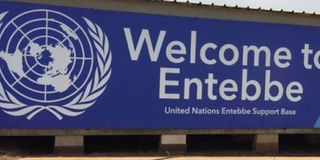Entebbe UN base to stay but 350 jobs at stake

Part of the UN base in Entebbe. The base will continue to perform but not under the UN Global Service Delivery Model. Net photo
Kampala- A new report by the United Nations Secretary-General Antonio Guterres has recommended to maintain the UN base in Entebbe but under the new arrangement, more than 300 jobs will be abolished in 2020 if the proposal is finally adopted by the General Assembly.
The report adds that the Regional Service Centre in Entebbe (RSCE) will “continue to perform functions not in the scope” of the UN Global Service Delivery Model (GDSM) reforms, including regional ICT services, regional training and conferences services, transport and movement services, and liaison offices for peacekeeping missions to Abyei and South Sudan.
The GDSM reforms championed by Mr Guterres are aimed at scaling down UN bases worldwide to create a lean and cost-effective UN system in few locations.
Other functions such as logistical hub for the UN Mission in DR Congo (MONUSCO), global procurement support section, civilian pre-deployment training team, regional ombudsman under the office of the Office of Internal Oversight Services and the UN Mine Action Centre, will all remain at Entebbe, according to the report.
“As a result, 545 staff and contractors would remain in Entebbe to perform these functions,” the report reads in part.
The January 8 report is a stark contrast to last year’s report which nearly took away all functions from the RSCE to the proposed Global Shared Service Centre in neighbouring Kenya’s capital Nairobi under GDSM reforms.
The previous May 2017 report had recommended that UN administrative functions be consolidated at three dispersed locations --- Nairobi, Budapest (Hungary) and City of Mexico (Mexico).
Proposals
In the new report, Mr Guterres proposed Montreal (Canada) in place of Mexico City, and Shenzhen (China), alongside Nairobi and Budapest. The four centres will be coordinated by the Office of the Director General sitting in Nairobi.
The duty stations most affected by implementation of the GDSM reforms include the UN headquarters in New York, RSCE, UN Iraq-Kuwait Observation Mission, Offices Away from Headquarters and Regional Commissions.
The report says the proposed GDSM model will reduce annual operational costs from $62.3m (about Shs228b) to $39m (about Shs144b).
“Total staffing across the four centres would be 780 staff in the first two years of operation, reducing to 684 staff in the third year as efficiency gains and process improvements are realised,” the report reads.
Diplomatic sources at the UN in New York told Daily Monitor the new report was shared with the Ugandan ministry of Foreign Affairs in Kampala a month ago.
Sources also deemed the new report “not as bad as the previous one” which the Uganda government rejected and President Museveni protested as “unfair” given Uganda’s substantial contributions to regional peace and security.
The abolition of the Shs21b RSCE last year triggered an avalanche of condemnation by Ugandan officials, Members of Parliament and would-be affected employees.
It also placed Uganda on a potential collision path with Kenya-- its key trading partner and export-import route-- and kicked up a flurry of intense diplomatic lobbying.
Nevertheless, at least 349 positions at the RSCE will be “abolished” or moved to Nairobi in 2020 if the report is adopted by the UN General Assembly in March.
Uganda’s permanent representative to the UN, Mr Adonia Ayebare referred this newspaper to officials in Kampala for a comment.
He, however, indicated that “the final decision will be taken by the member states” when they convene.
In Kampala, the ministry of Foreign Affairs permanent secretary Patrick Mugoya told Daily Monitor that the report is yet to go through the UN’s Advisory Committee on Administrative and Budgetary Questions (ACABQ) which has to make recommendations to the Fifth Committee for a decision.
“We will continue engaging the relevant authorities to highlight the benefits of Entebbe so that it keeps all functions,” Mr Mugoya said by telephone.
The ACABQ is a 16-member committee of experts elected by the UN General Assembly while the Fifth Committee is responsible for administrative and budgetary matters and its decisions inform UN General Assembly’s budget approval.
Diplomatic sources, however, intimated to Daily Monitor the new report was discussed last week by the ACABQ and await tabling before the Fifth Committee.
“This time around if the report is not approved, it will likely be shelved forever,” sources indicated.
Location contest
One of the headwinds awaiting the new report at the General Assembly is the geopolitical contest.
Sources said, for example, Montreal was selected in place of Mexico City, which had been selected as the choice in Latin America, and this will likely not go down well with the Latin American voting bloc.
In June last year, the Administrative and Budgetary Questions (ACABQ) punched holes in Mr Guterres’s earlier report and directed him to rework the GSDM reforms with guidance of the UN General Assembly and present a new report.
The ACABQ endorsed the principle of the GSDM in its recommendations to the UN’s Fifth Committee. However by that time it was procedurally late for discussion since
[email protected]



